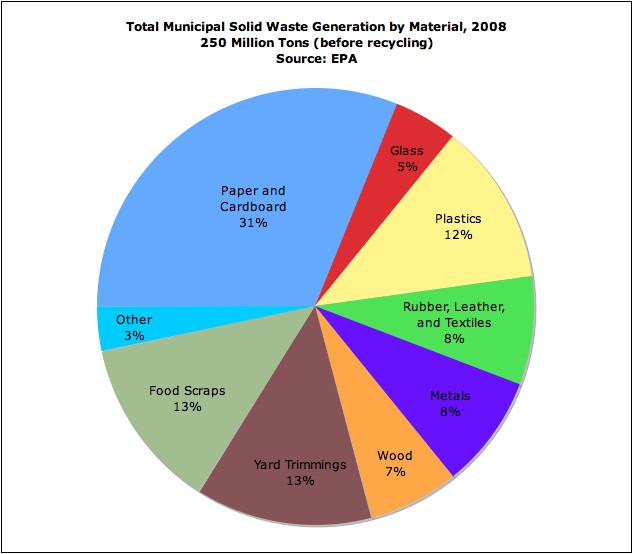Did you know that 98% of the recyclables you bring to Sedona Recycles get turned into new products right here in the US? Explore this section to learn more about recycling and the items we accept: paper, cardboard, expanded polystyrene foam, glass, plastic, aluminum, and steel.
Sedona Recycles provides free educational programs for schools, businesses, and other groups. Tours of our facility are also available. Contact us for more information.

Recycling Facts
- The United States produces 30% of the world’s solid waste and uses 30% of the world’s resources.
- The average American produces 4.5 pounds of waste every day.
- Approximately 90% of municipal solid waste is recyclable or compostable (see graph above).
- 80% of U.S. products are used once and then thrown away.
- For every ton of post-consumer waste there are 20 tons of hidden pre-consumer waste, as the manufacturing process makes its way from forest, field, and mine to supermarket shelf.
- An estimated 94% of the materials extracted for use in manufacturing durable products become waste before the product is even manufactured.
- Only 6% of minerals and renewable materials extracted each year are embodied in durable goods!
- Overall, America’s material and energy efficiency is no more than 1 or 2%.
- 43% of municipal waste, by weight, consists of packaging and containers, or disposable products such as paper or plastic plates, cups, diapers, junk mail, trash bags, tissue paper and towels.
- In 2008, a total of 83 million tons of waste was recycled or composted, saving 1.3 quadrillion Btu of energy, the equivalent of more than 10.2 billion gallons of gasoline.
- The recycling and reuse industry consists of approximately 56,000 establishments that employ over 1.1 million people, generate an annual payroll of nearly $37 billion, and gross over $236 billion in annual revenues.
- Total employment in the recycling industry from 1967 to 2000 grew by 8.3% annually while total United States employment during the same period grew by only 2.1% annually.
- Recycling saves money for manufacturers by reducing energy costs. In 2001, New Jersey’s recycling efforts saved a total of 128 trillion BTU’s of energy, equal to nearly 17.2% of all energy used by industry in the state, with a value of $570 million.
- The economic value of clean air, water and land is significant, but difficult to quantify. Since recycling plays an important role in protecting these natural resources it must be attributed an economic value in this context, as well.
- Well-run recycling programs cost less to operate than waste collection, landfilling, and incineration.
- The more people recycle, the cheaper it gets.
- For every job collecting recyclables, there are 26 jobs in processing the materials and manufacturing them into new products.
- Recycling creates four jobs for every one job created in the waste management and disposal industries.
